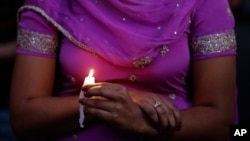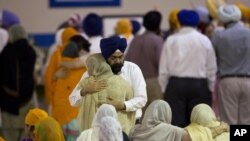U.S. authorities now say the gunman who killed six worshippers at a Sikh temple last weekend killed himself after being shot by police.
The Federal Bureau of Investigation said Wednesday that a policeman responding to the assault at the temple in the northern state of Wisconsin on Sunday shot the gunman, Wade Michael Page, in the stomach, but that Page died from a self-inflicted gunshot wound to his head.
Investigators have traced Page's extensive involvement with white supremacist groups in the United States. But FBI agent Teresa Carlson said at a news conference that they have yet to determine a motive for the killings. She said authorities already have interviewed 100 people nationwide who might have information about Page and his intentions leading up to the shooting.
"This is a guy that has moved around a lot, and so we are very, very thorough. We're going to try to talk everybody that he may have had contact with or anywhere that he may have been. So we've got leads going in a lot of different places," she said.
Carlson said investigators do not believe anyone else was involved in the attack.
The FBI agent said the agency had not opened an investigation of Page before he started firing shots inside the temple in a suburb of Milwaukee, which is Wisconsin's largest city. She said that no matter what "reprehensible" comments he might have made, the agency could not have opened an investigation until he threatened someone. The U.S. Constitution protects non-threatening freedom of speech.
"This is an issue where law enforcement has to continually balance the civil liberties, the rights that every U.S. citizen has to think what they want, believe what they want and say what they want. Obviously we cannot investigate people for any of those things. So, no matter how horrendous or reprehensible those things may be, until somebody actually threatens, there's a threat of force or violence, we cannot open an investigation," she said.
The Federal Bureau of Investigation said Wednesday that a policeman responding to the assault at the temple in the northern state of Wisconsin on Sunday shot the gunman, Wade Michael Page, in the stomach, but that Page died from a self-inflicted gunshot wound to his head.
Investigators have traced Page's extensive involvement with white supremacist groups in the United States. But FBI agent Teresa Carlson said at a news conference that they have yet to determine a motive for the killings. She said authorities already have interviewed 100 people nationwide who might have information about Page and his intentions leading up to the shooting.
"This is a guy that has moved around a lot, and so we are very, very thorough. We're going to try to talk everybody that he may have had contact with or anywhere that he may have been. So we've got leads going in a lot of different places," she said.
Carlson said investigators do not believe anyone else was involved in the attack.
The FBI agent said the agency had not opened an investigation of Page before he started firing shots inside the temple in a suburb of Milwaukee, which is Wisconsin's largest city. She said that no matter what "reprehensible" comments he might have made, the agency could not have opened an investigation until he threatened someone. The U.S. Constitution protects non-threatening freedom of speech.
"This is an issue where law enforcement has to continually balance the civil liberties, the rights that every U.S. citizen has to think what they want, believe what they want and say what they want. Obviously we cannot investigate people for any of those things. So, no matter how horrendous or reprehensible those things may be, until somebody actually threatens, there's a threat of force or violence, we cannot open an investigation," she said.








